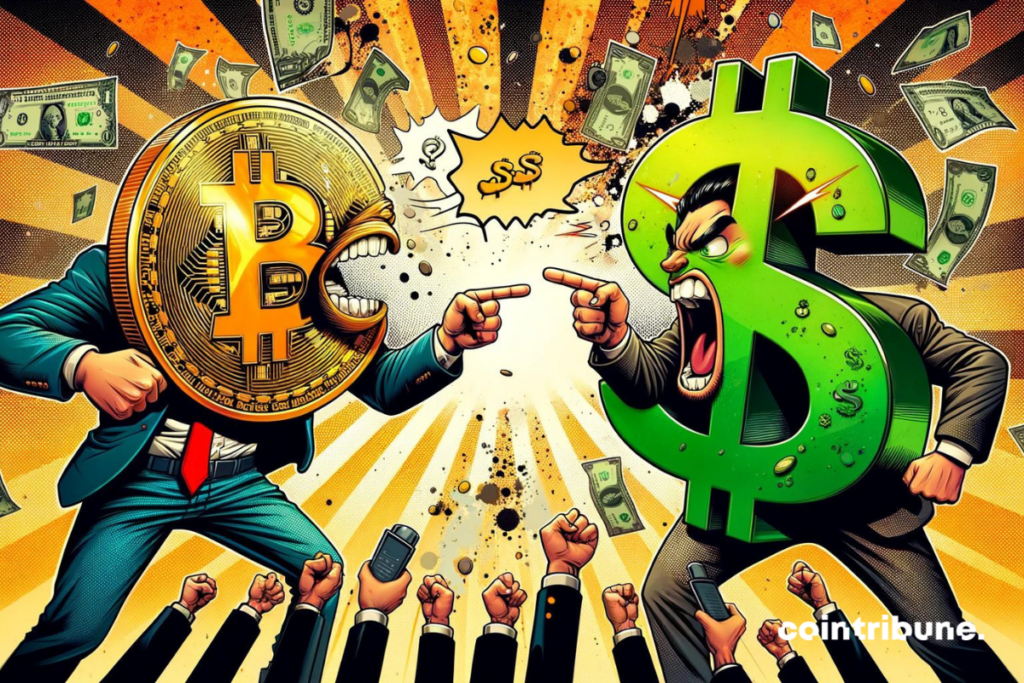Here’s why bitcoin will never replace the dollar according to Morgan Stanley!

12h30 ▪
4
min of reading ▪ by
In this period of economic turbulence marked by rampant inflation and a constantly increasing national debt, many are turning to bitcoin and other cryptos as a potential alternative to the dollar. However, a new analysis from Morgan Stanley highlights the reasons why the US dollar retains its supremacy and explains why it is unlikely that cryptos can replace it in the near future.

Morgan Stanley’s Statements
The financial experts at Morgan Stanley have recently shared their view on the issue of cryptocurrencies potentially replacing the dollar. According to them, despite the deterioration of American economic indicators and the rise of cryptos, the US dollar remains difficult to surpass. David Adams, head of G10 FX strategy at Morgan Stanley, stated: “Bitcoin is too volatile to be considered a true replacement for the US dollar.” He added: “If I hold a cryptocurrency that increases by 10% per month, I am less likely to use it for transactions. Instead, I would hold onto it to benefit from its appreciation.”
The experts at Morgan Stanley also pointed out that the recognition of a currency as legitimate takes decades. Although Bitcoin is currently the main contender, it is still far from being perceived as a stable haven by investors. The rapid fluctuations in its value and its primarily speculative use make it a poor candidate to replace the US dollar in daily commercial exchanges.
Cryptos vs Dollar: The Showdown Continues
The rise of bitcoin and alternative cryptocurrencies has interesting implications for the global economy, prompting governments and financial institutions to explore the creation of central bank digital currencies (CBDCs). Unlike cryptocurrencies, CBDCs issued by central banks could offer increased stability and broader adoption while incorporating the benefits of blockchain technology. These digital currencies could improve transparency, reduce transaction costs, and facilitate financial inclusion.
However, despite the rise of cryptocurrencies, the experts at Morgan Stanley remain confident in the resilience of the US dollar. Despite persistent inflation and rising national debt, the dollar maintains a dominant position due to its long history of stability and trust. Its central role in the global economy, used in the majority of international transactions and foreign exchange reserves, gives it considerable inertia, making its replacement difficult.
In conclusion, although cryptocurrencies and CBDCs present promising innovations, the US dollar remains the reference currency due to its historical stability and the continued trust it inspires. Bitcoin and other cryptos still have significant challenges to overcome, such as volatility and regulatory uncertainty, before they can truly compete with the dollar on the global stage.
Maximize your Cointribune experience with our ‘Read to Earn’ program! Earn points for each article you read and gain access to exclusive rewards. Sign up now and start accruing benefits.
Click here to join ‘Read to Earn’ and turn your passion for crypto into rewards!
Diplômé de Sciences Po Toulouse et titulaire d’une certification consultant blockchain délivrée par Alyra, j’ai rejoint l’aventure Cointribune en 2019.
Convaincu du potentiel de la blockchain pour transformer de nombreux secteurs de l’économie, j’ai pris l’engagement de sensibiliser et d’informer le grand public sur cet écosystème en constante évolution. Mon objectif est de permettre à chacun de mieux comprendre la blockchain et de saisir les opportunités qu’elle offre. Je m’efforce chaque jour de fournir une analyse objective de l’actualité, de décrypter les tendances du marché, de relayer les dernières innovations technologiques et de mettre en perspective les enjeux économiques et sociétaux de cette révolution en marche.
DISCLAIMER
The views, thoughts, and opinions expressed in this article belong solely to the author, and should not be taken as investment advice. Do your own research before taking any investment decisions.





